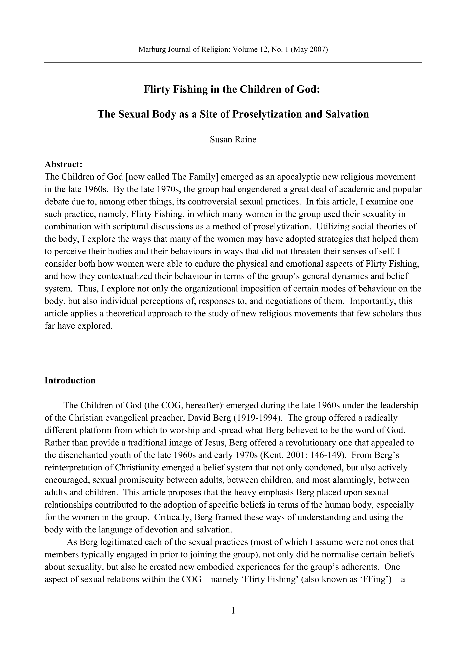Flirty Fishing in the Children of God: The Sexual Body as a Site of Proselytization and Salvation
The Children of God [now called The Family] emerged as an apocalyptic new religious movement in the late 1960s. By the late 1970s, the group had engendered a great deal of academic and popular debate due to, among other things, its controversial sexual practices. In this article, I examine one such...
Gespeichert in:
| 發表在: | Marburg Journal of Religion |
|---|---|
| 主要作者: | |
| 格式: | Artikel (Zeitschrift) |
| 語言: | 英语 |
| 出版: |
Philipps-Universität Marburg
2007
|
| 在線閱讀: | 在線閱讀 |
| 標簽: |
沒有標簽, 成為第一個標記此記錄!
|
| 總結: | The Children of God [now called The Family] emerged as an apocalyptic new religious movement in the late 1960s. By the late 1970s, the group had engendered a great deal of academic and popular debate due to, among other things, its controversial sexual practices. In this article, I examine one such practice, namely, Flirty Fishing, in which many women in the group used their sexuality in combination with scriptural discussions as a method of proselytization. Utilizing social theories of the body, I explore the ways that many of the women may have adopted strategies that helped them to perceive their bodies and their behaviours in ways that did not threaten their senses of self. I consider both how women were able to endure the physical and emotional aspects of Flirty Fishing, and how they contextualized their behaviour in terms of the group’s general dynamics and belief system. Thus, I explore not only the organizational imposition of certain modes of behaviour on the body, but also individual perceptions of, responses to, and negotiations of them. Importantly, this article applies a theoretical approach to the study of new religious movements that few scholars thus far have explored. |
|---|---|
| DOI: | 10.17192/mjr.2007.12.3608 |
